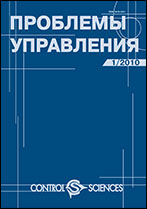|
This article is cited in 1 scientific paper (total in 1 paper)
Administration of engineering systems and technological processes
Control of effective implementation of technological processes for mechanical processing of parts in mechanical engineering
V. B. Melekhinab, V. M. Khachumovcd
a Daghestan State Technical University, Makhachkala, Russia
b Daghestan State University of National Economy, Makhachkala, Russia
c Federal Research Center «Computer Science and Control» of Russian Academy of Sciences, Moscow, Russia
d Program Systems Institute of Russian Academy of Sciences,Pereslavl-Zalessky, Russia
Abstract:
The main problems concerning effective implementation of technological processes in mechanical engineering under uncertainty are considered and solved. An integral criterion for efficiency estimation of the present state of technological processes is proposed, which allows reducing the solution of the multiobjective problem of choosing effective control actions to a single-objective optimization problem with both maximized and minimized efficiency indicators available. A method based on the use of fuzzy logic for processing expert data is presented, which makes it possible to form a multivariate analytical dependency between the efficiency indicators of the implemented technological process and the state parameters in the form of a linguistic function graph that ensures its required flow under changing operating conditions. A selection method is developed on an alternative basis of the most effective control actions in case of problem situations during the implementation of a complex technological process as a result of the influence of various disturbing environmental factors. In the selection method proposed, decision-making is based on a composition of correspondences that make it possible to relate disturbing factors of an unstable environment with control actions that ensure the efficient flow of a complex technological process. In general, control tools for deviation and disturbance compensation were obtained, which ensure the effective implementation of complex technological processes of machining parts in mechanical engineering in unstable environmental conditions.
Keywords:
technological process, efficiency indicators, disturbing factors, control parameters, effective control.
Received: 14.01.2019
Revised: 12.08.2019
Accepted: 30.09.2019
Citation:
V. B. Melekhin, V. M. Khachumov, “Control of effective implementation of technological processes for mechanical processing of parts in mechanical engineering”, Probl. Upr., 2020, no. 1, 71–82
Linking options:
https://www.mathnet.ru/eng/pu1176 https://www.mathnet.ru/eng/pu/v1/p71
|

|




 Contact us:
Contact us: Terms of Use
Terms of Use
 Registration to the website
Registration to the website Logotypes
Logotypes








 Citation in format
Citation in format 
